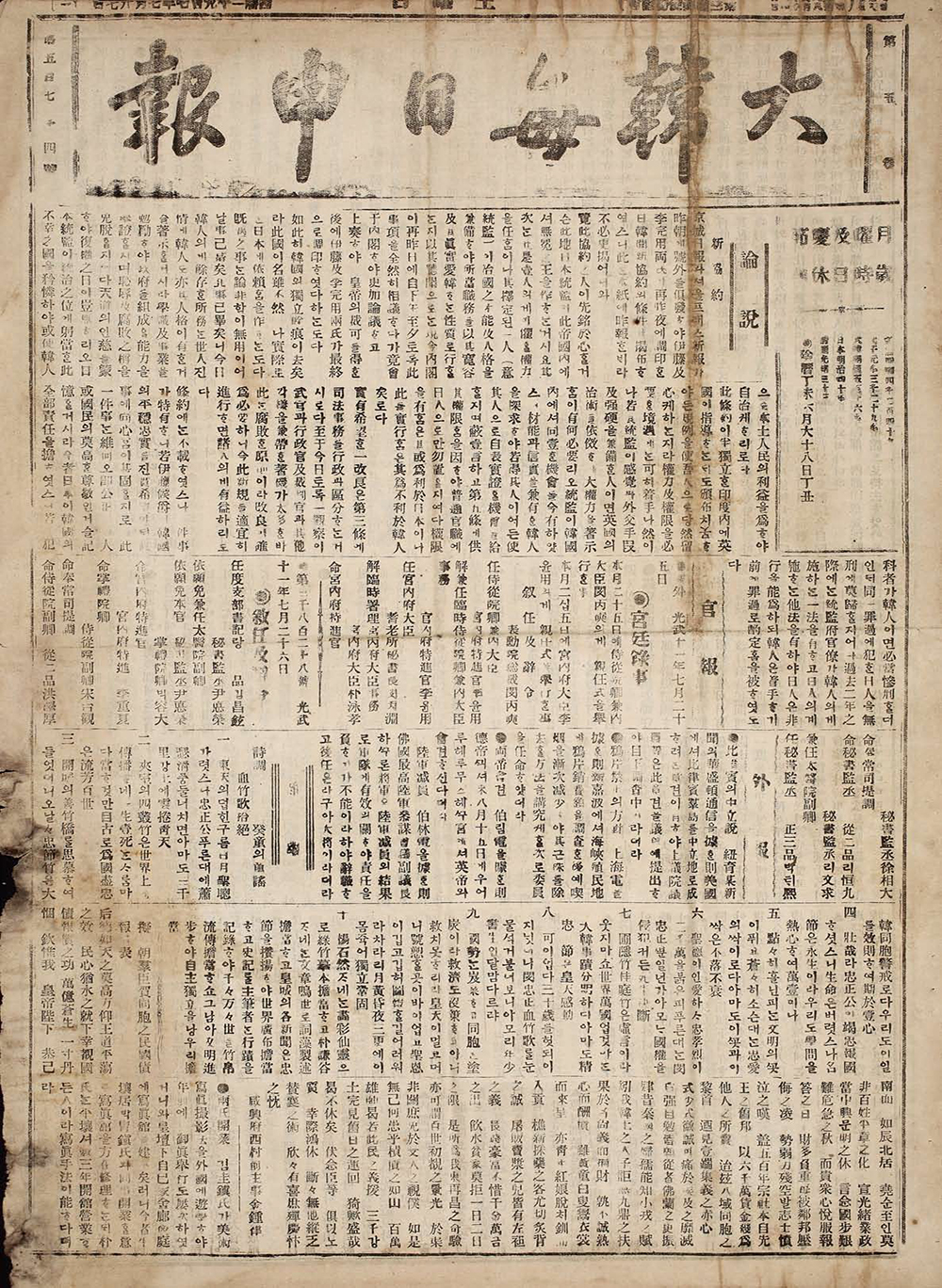Dokdo, the First Victim of Japan’s Aggression Against the Korean Peninsula
08. “New Treaty,” Daehan Maeil Shinbo (July 27, 1907)
Daehan Maeil Shinbo
“New Treaty,” Daehan Maeil Shinbo (July 27, 1907)
[Translation]
Editorial
“New Treaty (The Korea-Japan Treaty of 1907)”
Both the Gyeongseong Ilbo and the Seoul Press Shinbo issued extras yesterday morning to announce the terms of the Korea-Japan Treaty of 1907 signed by Ito and Yi Wan-yong* a couple of nights ago. The treaty was covered by this newspaper yesterday and, thereby, does not need to be printed again, and the first thing people should lay to their heart upon seeing this treaty is that [it] makes the Japanese resident-general in this land an uncrowned king in this empire.
The second thing is that formidable authority will be invested in this one person, but whether this selected person (resident-general) will have both talent for governing a nation and fine character and perform his duties with tolerance and honesty in a way that shows care for Korea remains to be seen. According to what is known, the current cabinet ministers discussed these matters (the terms of the treaty) in depth from afternoon to evening a couple of days ago and finally got together discuss it further and present it to the Emperor. After obtaining the Emperor’s sanction, Ito and Yi Wan-yong singed it as a final step.
Thus, what was left of Korea’s independence is now gone. Though it is not nominally, in reality, this nation is now entrusted to Japan. It is no use denying what has already happened; it has already been suffered and is already over. What is left for the Koreans to do now is to make the people of the world truly see that we also have character. If [we] encourage learning and business and prove [our] ability to form [our own] government, [we] will be able to clear our name of shame and corruption. There will surely be a day of reinstatement by the grace of the way of Heaven.
In his role, the Japanese resident-general should personally feel pity for this unfortunate nation, and by any chance, allow the Koreans autonomy for the benefit of people on the mainland. This treaty naturally makes us aware of the rules and regulations which could not be proclaimed even within semi-independent India despite guidance from the United Kingdom. If power and rights are needed, [the new treaty] may well be enforced. However, if the resident-general is a benevolent person with sensibility, diplomatic skills, and toughness, he can imitate and follow the United Kingdom’s governing skills and does not need to wield great power.
As the resident-general now has the same opportunity in Korea [as his British counterpart], he should seek the Koreans who are both talented and trustworthy and, when found, give them an opportunity to prove their worth. In a word, when exercising the right prescribed in Article 5 [of the treaty], he should not appoint only Japanese to general posts. Having the right is advantageous to Japan, but its execution is disadvantageous to the Koreans. The one improvement that can actually be hoped for is the separation of judicial and administrative affairs as specified in Article 3. To this date, in many cases, one provincial governor serves in multiple positions of military officer, administrator, judge, and more in his province. This is a bad practice and clearly requires correction. If this new rule is properly implemented, it will benefit many.
Though not defined in the treaty, there is a special matter. If Marquise Ito truly wishes for Korea’s peace and integrity but is preoccupied with his mission, what will then be one thing that matters? Remember it is about fairness XXX or respect from the people. Now that Japan is responsible for all of Korea, it will severely punish Korean offenders without fail while acquitting their Japanese counterparts committing the same offenses. During the last two years, the government-general officials have applied different rules to the Koreans and to Japanese for the same offenses, allowing the Japanese to easily commit wrongdoing and leaving the Koreans to be judged based on their past records even before anything happened.
* Yi Wan-yong was a pro-Japanese minister of Korea who was instrumental in placing Korea under Japan’s control. - “XXX” means a missing word.
[Original Text]















